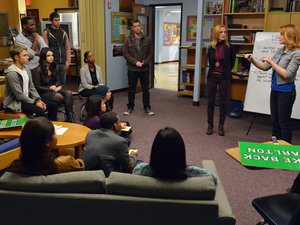By David H. Kirkwood
It’s not often that commercial television airs something as bold and downright different as last week’s episode of Switched at Birth, an ABC Family program that is shown Mondays at 9 pm Eastern.
In case you’ve never watched Switched, the premise is that two baby girls born the same day in the same hospital are sent home with each other’s mother. Daphne, who grows up with a poor single mother, contracts meningitis at an early age and become deaf. Bay, who has normal hearing, is raised by an affluent couple.
By chance, Bay learns from a blood test she takes in a high school chemistry class that she cannot be the biological child of the couple who raised her. After an investigation reveals that the girls were accidentally switched at birth, the families meet, the two teenage girls become close friends, and eventually Daphne moves in with Bay and her parents.
When I watched the premiere back in June 2011, I wrote a Hearing View noting, “The initial episode did a good job of raising some of the contentious issues that surround deafness (deaf school vs. mainstream, signing vs. lipreading, whether or not to get a cochlear implant), and did so without being too heavy-handed.”
While I was favorably impressed then by what I saw, I didn’t get around to watching any more episodes—at least not until last week. That’s when I learned that the March 4 show was going to do something unprecedented in television history. Throughout the episode, almost all the dialogue was presented in American Sign Language (ASL) rather than spoken. Except for a very few spoken words, some background music, and police sirens at the end, the show was silent—as silent as the world always is for those who are deaf.
Granted, subtitles were provided so that viewers who don’t know ASL could follow. Still, it was a pretty gutsy move for a TV program to present a whole episode filled with characters holding animated conversations in a language that the hearing audience not only couldn’t understand, but couldn’t even hear.
As the producers undoubtedly were aware, indeed intended, the show created an unsettling experience for people unaccustomed to being surrounded by signers. I’ll bet a lot of people checked the mute button on their remote or switched channels to make sure there was something wrong with the sound on their set.
Some of those probably switched away from Switched at Birth to a program they could hear. However, not too many did. The Nielsen ratings were down only marginally, from the usual 1.7 million viewers to 1.6 million. And many in the great majority who stayed with the show gave it high praise.
Writing in The New York Times, Brian Stelter reported that deaf students at Gallaudet University gathered for viewing parties for the March 4 show and afterwards the university sent ABC Family 35 pages of Facebook comments it had received about the episode.
Howard A. Rosenblum, CEO of the National Association of the Deaf, called the episode “a phenomenal and groundbreaking first in television history” and expressed NAD’s “gratitude and appreciation to ABC Family.”
UNCOMFORTABLE ISSUES RAISED
Its silence was not all that made this program noteworthy—and possibly took many viewers outside their comfort zone. The episode, like many in the series, raises some difficult issues. Entitled “Uprising,” it takes place at Carlton, a school for the deaf that is about to be closed for financial reasons. A group of outraged students, led by Daphne, seize control of the school demanding that it remain open so they won’t have to return to, as one boy signs, “the hell of mainstream schools.”
That’s a provocative viewpoint, one I doubt that most of you reading this share. Certainly I don’t. With all due respect to the National Association of the Deaf and the Deaf Community, I believe that ideally the goal of hearing health care and of education should be to enable all people with hearing loss to lead gratifying and successful lives among hearing people should they wish to do so.
Yet, I think that, along with being entertaining, Switched at Birth provides a valuable educational service in showing attractive, credible, and committed young people espousing Deaf Culture positions. You don’t have to agree with them, but the program does give you an understanding of how they feel and why.
Another sometimes divisive issue that is debated in “Uprising” is whether the protesters should permit the few Carlton students who have some hearing to take part in the school takeover or whether the movement is exclusively for the deaf.
The episode also offers a history lesson. The protesting students on the show, who display posters saying “Take Back Carlton,” draw their inspiration from the real-life “Deaf President Now” movement by Gallaudet University students in 1988. For many in the TV audience, last week’s Switched was probably the first they had heard about that landmark event in which the protesters succeeded in forcing the university to replace a newly appointed president who could hear with I. King Jordan, who became Gallaudet’s first deaf leader.
All in all, Switched at Birth rises far above the standard fare of family TV. I urge you to see it for yourself. At least for now, you can view the all-ASL episode online. Go to the show’s home page and click on Episodes. You can also watch this week’s season-ending program and find out how the Take Back Carlton campaign turns out. I’m not telling.








I also watched this episode – and all the previous ones. I thought it was done well. I have expeirenced the culturally Deaf, deaf, and hh students. What this episode also dealt with was Deaf identity. I agree that it is a great family show and it deals with every day issues but with Deaf/deaf/HH characters.